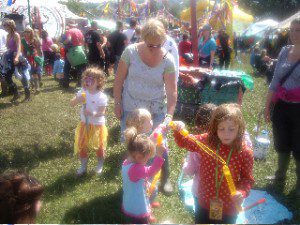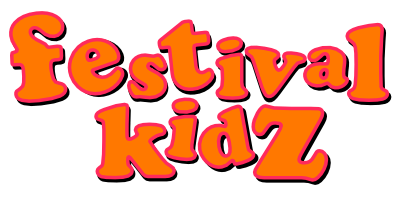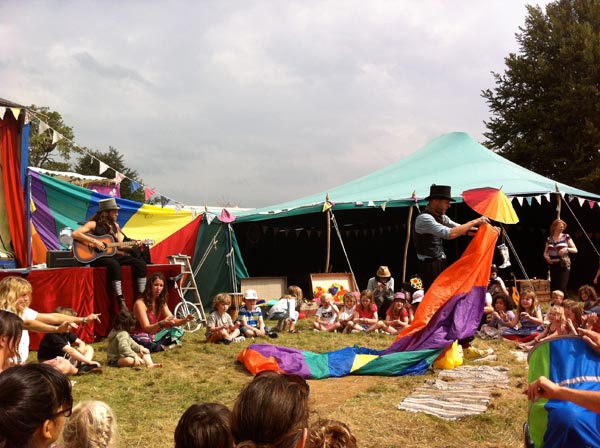 I love festivals, everyone knows that!
I love festivals, everyone knows that!
My reasons for going to them have over the years changed and my circumstances have certainly changed. Before it was all about me and my friends, now it’s not just about me and my friends; it’s also about my son and considering my reasons for taking him.
I want him to enjoy going to to festivals and have plenty of wonderful experiences from going, and from those experiences he can hopefully benefit every day.
At the grand old age of 3 (nearly 4) he already talks about and looks forward to his festival holidays. He is unaware of how much he learns from going to them, but such life experiences are hard to find elsewhere.
All this made me reflect on what those experiences can teach him? How can he develop from them?
When I asked the question ‘What do children learn at festivals?’ I did not expect to get such a wonderful amount of feedback on what people think children can learn. Just So Festival have carried out some wonderful research on this subject. I adore some of the quotes they got from children “I loved doing the crafts”, “playing in the muddy puddles”, “banging to the beat with the samba band”, hill sliding on my bottom” and “I saw the tree and it had an eye”. They discuss their Spellbound Forest event, where children read text extracts, interact with actors, dance and play hide and seek at the fairy ball, and make hobby horses – all wonderful hands on learning. This is the link to the research: http://issuu.com/justsofestival/docs/rumpusresearch2 – It’s a lovely read if you have time to look over, thanks to Just So for sharing it with us.
Here’s what I believe are the Top 10 incidental things young children learn at festivals, I could have gone up to 100 there’s so many to choose from (especially when you consider the educational content of workshops), but these are my favourites:
We asked Jess, an Early Year’s practitioner, to relate each point to the specific areas of the Early Years Foundation Stage (EYFS) Framework for children’s learning from birth to five (italics). See bottom of page for further info.
10. Behaviour and responsibility
To listen carefully to instructions from parents and other people. To take instruction in workshop and on-site activities and also to take some responsibility for their own personal safety.
PSED – Managing feelings and behaviour
CL – Listening and Attention
9. Forming relationships with others
Making friends with adults and peers of mixed ages. Getting involved in groups and practising both taking turns and working together.
PSED – Making relationships
CL – Listening and attention, Understanding
8. Self confidence and self esteem
To be confident to try new things. From joining in with new activities, with new groups of people, and confidently dealing with new environments to taking part in workshops and perhaps even getting involved in a performance.
PSED – Self confidence and self awareness
CL – Speaking (eg. in performances)
7. Sense of community and meeting people
Everyone is very much in the same situation at a festival. The festival for those few days becomes your world, where people from all walks of life are joined by a common ‘festival-going’ bond.
PSED – Managing feelings and behaviour, making relationships
PD – Health and self care
UW – People and Communities
6. Different foods
Trying foods that they would never usually have at home. There are often different tastes, textures and smells from all corners of the world at festivals.
PSED – Self confidence and self awareness
UW – The World
5. Different types of music
They may only have listened and danced to music you listen to – festivals are always a great chance to hear new music and to watch how the performers relate to the music and audience.
CL – Listening and attention
4. Play / stimulating imagination
Listening to new stories and spoken word, enriching their vocabulary and worldly understanding, and in turn incorporating it into their own play and learning.
CL – Listening and attention
EAD – Exploring and using media and materials, Being imaginative
3. Independence / feeling free to be themselves and to accept others
To be able to feel like they can be whatever they want to be, and to see other people very comfortably expressing themselves in their own special ways too!
PSED – Self confidence and self awareness
EAD – Being imaginative
2. Camping, bushcraft and nature
To have more of a understanding of the weather, the nature around them, respecting the environment, the importance of keeping warm, dry, or whatever is appropriate.
PD – Health and Self-care
CL – Understanding
UW – The World
1. To see and hear things they would never normally experience.
They will be in a totally different environment, away from home, with different people, different food, the whole day will be spent doing and seeing things they would not normally.
CL – Listening and attention
PSED – Self confidence and self awareness
-o-
EYFS notes: Personal, Social and Emotional Development (PSED), Communication and Language (CL) and Physical Development (PD) are the three prime areas which are crucial for igniting children’s curiosity and enthusiasm for learning, and for building capacity to learn, develop relationships and thrive. The other specific areas, Literacy (L); Mathematics (M); Understanding of the World (UW); Expressive Arts and Design (EAD), are dependent on development in those prime areas. A Parent’s Guide to the Statutory Framework for EYFS can be downloaded here: www.foundationyears.org.uk/…/EYFS_Parents_Guide.doc
So go on – do it!
Take your children to a festival this year and let us know what they learn.
Whatever it is, they will keep the knowledge forever.
Further Reading:
Get Festivals on the National Curriculum!

